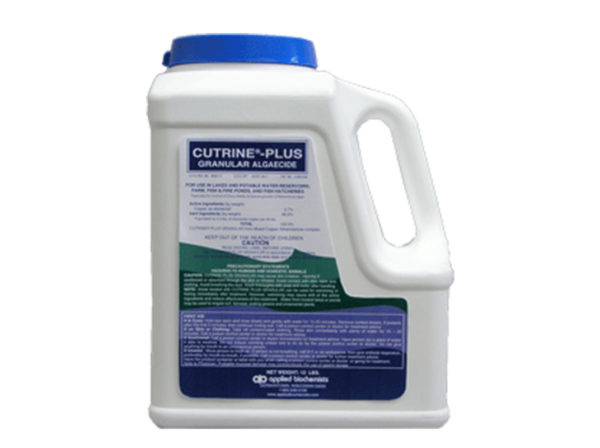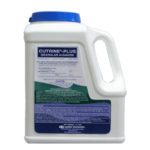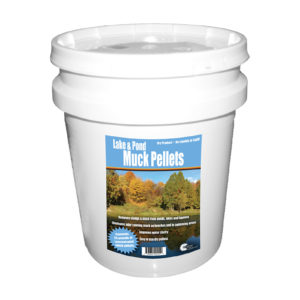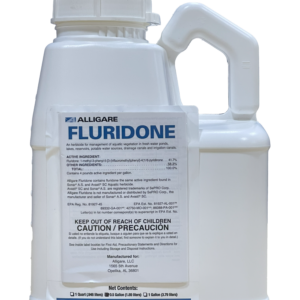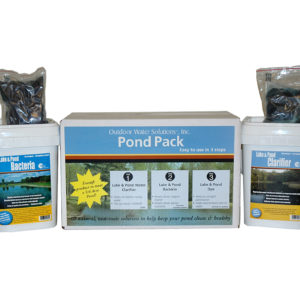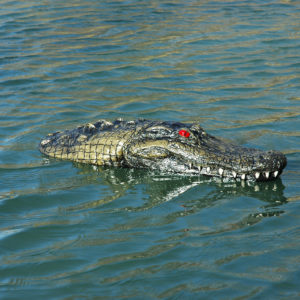Description
Cutrine Granular – 12 lbs or 30 lbs.
Cutrine Granular is a 3.7% granular chelated copper algaecide ideally suited for treatment of bottom growing algae including Chara and Nitella and spot treatments along docks, beaches, boat launches, and fishing areas. This formulation helps control growth before it reaches the surface. Cutrine Plus Granular is registered for use in lakes, potable water reservoirs, farm and fish ponds, fish hatcheries, and golf course water hazards. Treated water may be used for swimming, fishing, drinking, livestock watering, or irrigation immediately after treatment. Spread as evenly as possible over treatment area at a rate of 1 pound per 750 spuare feet or 60 pounds per surface acre.
Once contact is established, CUTRINE Granular begins to work immediately to break down the algaes cellular structure and interrupt the ability to photosynthesize food. Controls Planktonic Algae in 24 to 48 hours, Filamentous Algae in 3 to 4 days.
Early treatment when growth first appears or begins to create a nuisance will reduce the amount of CUTRINE granular you will need. Early treatment will also reduce the amount of dead growth. Only treat 1/3 to 1/2 of your pond at a time to prevent oxygen depletion.
Click here to view the full product label for Cutrine Plus Granules
* Cannot be shipped to California, Connecticut, Maine, Michigan, New Jersey, New York, Oregon or Washington
* Cannot be shipped to Canada
The Landscape of Your Pond
The habitat of a pond contains a collection of naturally occurring components, such as fish and algae. An aeration system that provides aeration can also be an important part of the pond’s environment. However, you may find other naturally occurring items growing in and around the pond, including weeds. When it comes to pond weed, they can be a nuisance to deal with and can even ruin the landscape of your pond. This is where pond microbes can come in to help. Outdoor Water Solutions carries a wide variety of products to help you control pond weeds. In this article, we’ll go over what pond microbes are and which types work best for specific pond weeds.
Pond Microbes
To put it simply, pond microbes are sorts of bacteria that help break down organic matter in a pond. These microbes can also be referred to as microorganisms. A pond will contain both good and bad bacteria. Basically, good bacteria will thrive in a pond that has high levels of oxygen, and bad bacteria works in a pond with little to no oxygen. The problem with bad bacteria is that it will create large areas of sludge as it breaks down organic material. Rest assured that the bacteria or pond microbes that you find on the market are good bacteria, which will benefit your pond.
Now, let’s take a look at your chemical options.
- Cutrine: The product Cutrine works best to keep algae and Chara at bay. A simple treatment should do the trick.
- Green Clean: Another product you can consider is Green Clean, which is great to control algae.
- ShoreKlear: ShoreKlear will work best to control emerged and floating weeds. In particular, you will find excellent results for alligator weeds, Water Primrose, Cattails and more. When it comes to floating weeds, ShoreKlear will be able to control Water Shield, Water Hyacinth, American Lotus and many others with excellent results.
- Reward & Weedtrine: This alternative will give you good results for emerged, submerged and floating weeds. However, you may have to treat the area more than once for better and long-term effects. Water Primrose and Naiad weeds will have the best results with the Reward & Weedtrine products.
- Navigate: The Navigate microbe products work for both submerged and floating weeds. These can include Bladderwort, Coontail, American Lotus and Water Lettuce weeds, just to mention a few. You will find the best results with the Eurasian Watermilfoil weeds.
- Sonar: The Sonar Pond microbes are some of the best choices on the market. This product will work on emerged, submerged and floating pond weeds. However, you will get the best results for submerged pond weeds, including American Pondweed, Naiad, Hydrilla/Elodea and others.
- Flumigard: The Flumigard microbe treatment is a product that you may have to use more than once for those long-term effects. Moreover, this alternative boasts excellent results for submerged and floating weeds. You’ll be able to treat Sago Pondweed, Curly Leaf Pondweed, Duckweed, Water Lettuce and Watermeal weeds.

